Dialogue 2023 in Bengaluru Sparks In-Depth Discussions on Contemporary Science and Technology Policy Issues
The Office of the Principal Scientific Adviser to the Government of India jointly with the Indian Institute of Science, Bangalore, convened one of its kind S&T Policy summit – ‘Dialogue 2023: Expanding Science and Technology Horizon’ on November 18, 2023, in Bengaluru.
The summit was inaugurated by Prof. T.A. Abinandanan of the Indian Institute of Science.Prof. G. Rangarajan, Director, Indian Institute of Science, delivered the opening address and introducedthe theme of the summit.Prof. Ajay Kumar Sood, Principal Scientific Adviser to the Government of India, delivered the keynote address on ‘Expanding S&T horizon: Within and Beyond’.
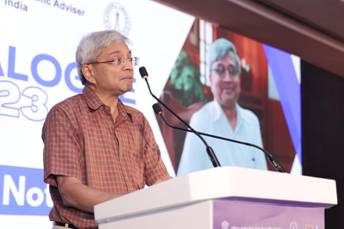
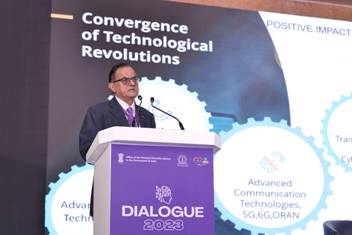
(Before: Prof. G. Rangarajan, Director, IISc Bangalore delivering the opening address; After: PSA Prof. Ajay Kumar Sood delivering the keynote address)
In his keynote address, Prof. Sood shared insights on India’s technological advancement and various missions that are driving national technology competitiveness. He emphasized theconnection between Science, Research, Education, and Innovation, underscoring their role in achieving Sustainable Development Goals.
The forenoon sessions of the summit focused on the theme of ‘Shaping Technological Futures’ and the afternoon sessions on ‘Science, Technology and Society’. The session on ‘Ethics of Disruptive Technologies’ featured a free-flowing conversation between a renowned technologist, Dr Sharad Sharma, co-founder of iSPIRT Foundation, and an eminent technology ethicist, Prof. Nimmi Rangaswamy, Professor at the International Institute of Information Technology, Hyderabad. The conversation touched upon various facets of ethical principles for shaping anticipatory governance strategies in dealing with disruptive technologies.
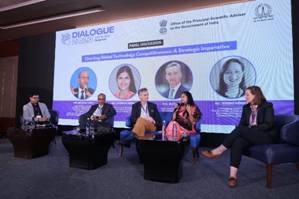
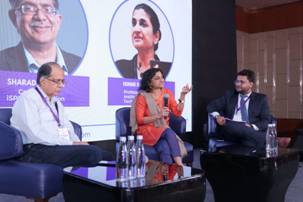
(Before: Dr. Sharad Sharma and Prof. Nimmi Rangaswamy engaging in the dialogue on ‘Ethics of Disruptive Technologies’; After: Speakers deliberating during a panel discussion on ‘Charting Global Technology Competitiveness: A Strategic Imperative’)
The session on ‘Charting Global Technology Competitiveness: A Strategic Imperative’ featured a special address by Shri Abhishek Singh, IAS, President & CEO of the National e-Governance Division (NeGD) and MD & CEO of Digital India Corporation (DIC). Shri Singh’s address encapsulated India’s digital transformation and global positioning through G20 and GPAI. The special address was followed by a panel discussion, joined by H.E. Alex Ellis, High Commissioner of the United Kingdom to India; Ms. Nivedita Mehra, Managing Director, US India Strategic Partnership Forum (USISPF); and Ms. Wiebke Doerfler, Managing Director, The Bavarian-Indian Centre for Business and University Cooperation (BayIND). The panel discussed various factors that influence global technology competitiveness.
The afternoon session featured a Workshop on the Diversity of Knowledge – People and Practices. The first segment, titled ‘Diversity of Knowledge: Practice’ had lightening talks on diversity of knowledge and knowledge systems. The session was joined by Prof. Wiebe Bijker, Professor Emeritus of Maastricht University, Dr. Annapurna Mamidipudi, Post-Doctoral Researcher, Technical University of Berlin, and Ms. Uzramma, Co-founder, Handloom Futures Trust, Hyderabad.
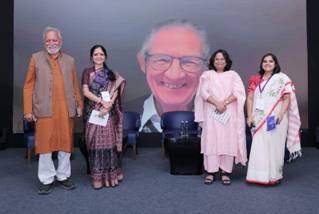
(Speakers of the workshop on ‘Diversity of Knowledge: People and Practices’)
The second segment titled ‘Diversity of Knowledge: People’ featured three lightning talks. Prof. Anil Gupta, Founder of Honey Bee Network, highlighted the importance of treating local knowledge holders as valuable sources of knowledge in our policies. Dr. Anamika Dey, CEO of Grassroots Innovations Augmentation Network (GIAN), spoke about viewing the diversity of knowledge through a gender lens. Dr. Viswajanani Sattigeri, Head of CSIR-Traditional Knowledge Digital Library (TKDL), presented a policy perspective on integrating traditional knowledge systems.
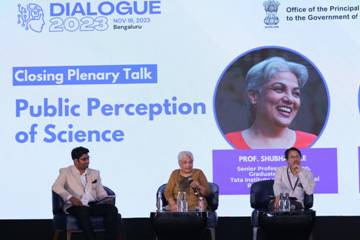
(Prof. Shubha Tole and Prof. Navakanta Bhat engaging with the participants during the concluding session of the summit)
The summit concluded with a closing plenary session featuring a popular talk on the ‘Public Perception of Science’ delivered by Prof. Shubha Tole, Senior Professor, and Dean of Graduate Studies at the Tata Institute of Fundamental Research, Mumbai. In her talk, Prof. Tole emphasized the need for extended public outreach and engagement in science. She also provided recommendations for scientists and scientific institutions to strengthen their capacity for outreach activities. This session was chaired by Prof. Navakanta Bhat, Dean, Division of Interdisciplinary Sciences of IISc. The session culminated with an engaging open discussion, providing participants with the opportunity to share their thoughts and insights. The summit concluded with a vote of thanks.

